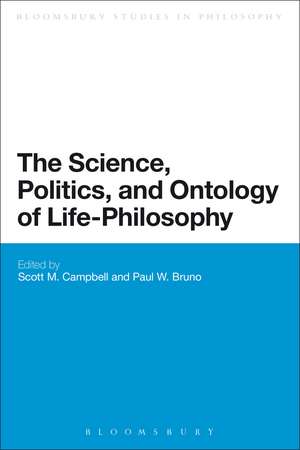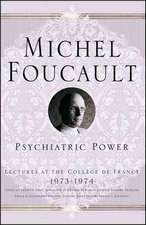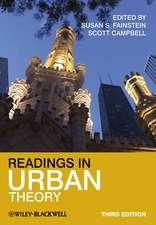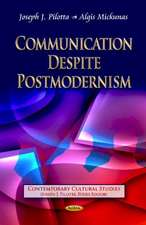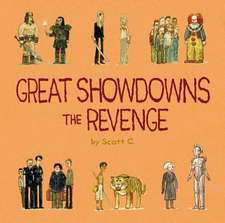The Science, Politics, and Ontology of Life-Philosophy: Bloomsbury Studies in Philosophy
Editat de Dr Scott Campbell, Paul W. Brunoen Limba Engleză Paperback – 19 noi 2014
| Toate formatele și edițiile | Preț | Express |
|---|---|---|
| Paperback (1) | 258.89 lei 6-8 săpt. | |
| Bloomsbury Publishing – 19 noi 2014 | 258.89 lei 6-8 săpt. | |
| Hardback (1) | 774.62 lei 6-8 săpt. | |
| Bloomsbury Publishing – 8 mai 2013 | 774.62 lei 6-8 săpt. |
Din seria Bloomsbury Studies in Philosophy
- 13%
 Preț: 257.50 lei
Preț: 257.50 lei - 13%
 Preț: 256.77 lei
Preț: 256.77 lei - 22%
 Preț: 256.20 lei
Preț: 256.20 lei - 22%
 Preț: 257.03 lei
Preț: 257.03 lei - 13%
 Preț: 255.47 lei
Preț: 255.47 lei - 22%
 Preț: 237.28 lei
Preț: 237.28 lei - 22%
 Preț: 257.50 lei
Preț: 257.50 lei - 22%
 Preț: 773.81 lei
Preț: 773.81 lei - 13%
 Preț: 256.20 lei
Preț: 256.20 lei - 13%
 Preț: 255.11 lei
Preț: 255.11 lei -
 Preț: 256.20 lei
Preț: 256.20 lei - 22%
 Preț: 772.58 lei
Preț: 772.58 lei - 22%
 Preț: 240.50 lei
Preț: 240.50 lei - 22%
 Preț: 257.03 lei
Preț: 257.03 lei - 23%
 Preț: 255.84 lei
Preț: 255.84 lei - 23%
 Preț: 255.29 lei
Preț: 255.29 lei - 13%
 Preț: 237.28 lei
Preț: 237.28 lei - 13%
 Preț: 235.00 lei
Preț: 235.00 lei -
 Preț: 258.42 lei
Preț: 258.42 lei -
 Preț: 256.49 lei
Preț: 256.49 lei - 14%
 Preț: 773.06 lei
Preț: 773.06 lei - 30%
 Preț: 774.03 lei
Preț: 774.03 lei - 30%
 Preț: 774.20 lei
Preț: 774.20 lei - 30%
 Preț: 774.86 lei
Preț: 774.86 lei
Preț: 258.89 lei
Preț vechi: 331.89 lei
-22% Nou
Puncte Express: 388
Preț estimativ în valută:
49.55€ • 51.54$ • 41.52£
49.55€ • 51.54$ • 41.52£
Carte tipărită la comandă
Livrare economică 13-27 martie
Preluare comenzi: 021 569.72.76
Specificații
ISBN-13: 9781472591586
ISBN-10: 1472591585
Pagini: 304
Ilustrații: 1 halftone illus
Dimensiuni: 156 x 234 x 20 mm
Greutate: 0.43 kg
Editura: Bloomsbury Publishing
Colecția Bloomsbury Academic
Seria Bloomsbury Studies in Philosophy
Locul publicării:London, United Kingdom
ISBN-10: 1472591585
Pagini: 304
Ilustrații: 1 halftone illus
Dimensiuni: 156 x 234 x 20 mm
Greutate: 0.43 kg
Editura: Bloomsbury Publishing
Colecția Bloomsbury Academic
Seria Bloomsbury Studies in Philosophy
Locul publicării:London, United Kingdom
Caracteristici
Analyses the concept of life from different perspectives: politics, evolution, ontology, ancient philosophy, phenomenology.
Notă biografică
Scott M. Campbell is Professor of Philosophy at Nazareth College, Rochester, New York, USA.Paul W. Bruno is Associate Professor of Philosophy at Framingham State University, Massachusetts, USA.
Cuprins
Notes of Contributors \ Acknowledgements \ Editors' Introduction Scott M. Campbell and Paul W. Bruno \ Part I: Life-Contexts in Dilthey, Nietzsche, and Bergson \ 1. Dilthey as a Philosopher of Life Rudolf A. Makkreel \ 2. Biological and Historical Life: Heidegger between Levinas and Dilthey Eric Nelson \ 3. Your Money or Your Life: Using Nietzsche's Critique of Mechanism and Platonism to Defend the Biosphere Ronnie Hawkins \ 4. The Comprehensive Meaning of Life in Bergson Florence Caeymaex \ Part II: Converging Technologies \ 5. Information, Self-Reference, and the Magical Realism of "Life" H. Peter Steeves \ 6. The Artificialization of Life: Designing Self-Organization Jean-Pierre Dupuy \ 7. eLife: From Biology to Technology and Back Again Jos de Mul \ 8. Philosophy of Life in the Age of Information: Seinsgeschichte and the Task of "An Ontology of Ourselves" Charles Bonner \ Part III: Life, Power, Politics \ 9. "Without Inside or Outside": Nietzsche, Pluralism and the Problem of the Unity of Experience Michael J. O'Neill \ 10. Anachronism and Powerlessness: An Essay on Postmodernism Leonard Lawlor \ 11. Taking Hold of Life: Liberal Eugenics, Autonomy, and Biopower Serena Parekh \ Part IV: Philosophies of Life \ 12. The Care of the Self and The Gift of Death: Foucault and Derrida on Learning How to Live Edward McGushin \ 13. The Tragic Sense of Life in Heidegger's Readings of Antigone Scott M. Campbell \ 14. Living the Pyrrhonian Way Stephen Clark \ 15. Intuition as the Business of Philosophy: Wittgenstein and Philosophy's Turn to Life Neil Turnbull \ 16. On Life and Desire: Kant, Lewontin, and Girard Paul Bruno \ 17. The Wisdom of Emotions Jason Howard \ 18. History in the Service of Life: Nietzsche's Genealogy Allison Merrick \ Index
Recenzii
This book should be in every library and in many personal collections. Campbell and Bruno have assembled essays from an international selection of today's leading thinkers on philosophy of life, offering new directions to this ongoing branch of thought.
This collection provides a highly original synthesis of conceptions of life that bring philosophy, especially the "life-philosophy" initiated by Nietzsche, Dilthey and Bergson, into dialogue with contemporary life sciences. Accessible and eminently readable, the essays in this volume give a broad, comprehensive account of the many complications that we face today, with increased impact of technology and life sciences on "life itself." Key issues concerning the "right to life" and artificial reproduction of life, the ontology and politics of genomics and "the good life," are productively brought to light by first-class philosophical analysis engaging post-existentialist thought in Heidegger, Wittgenstein, Arendt, Foucault, Jonas, Lyotard and Derrida.
In a world where we encounter new technologies and new forms of life every day, this volume is a clarion call to think about what life means now. Each author uncovers fresh resources in the western philosophical tradition for thinking deeply about life and meaning by reaching behind debates over biotechnology and biopower and beyond the dominant figures of Foucault and Deleuze. They tap into strands of thought running from Bergson back through Nietzsche and Dilthey, and from Foucault all the way back to Pyrrho and the Ancient Sceptics. This is a valuable volume that belongs on the bookshelf of everyone who believes in keeping the life in the examined life.
This collection provides a highly original synthesis of conceptions of life that bring philosophy, especially the "life-philosophy" initiated by Nietzsche, Dilthey and Bergson, into dialogue with contemporary life sciences. Accessible and eminently readable, the essays in this volume give a broad, comprehensive account of the many complications that we face today, with increased impact of technology and life sciences on "life itself." Key issues concerning the "right to life" and artificial reproduction of life, the ontology and politics of genomics and "the good life," are productively brought to light by first-class philosophical analysis engaging post-existentialist thought in Heidegger, Wittgenstein, Arendt, Foucault, Jonas, Lyotard and Derrida.
In a world where we encounter new technologies and new forms of life every day, this volume is a clarion call to think about what life means now. Each author uncovers fresh resources in the western philosophical tradition for thinking deeply about life and meaning by reaching behind debates over biotechnology and biopower and beyond the dominant figures of Foucault and Deleuze. They tap into strands of thought running from Bergson back through Nietzsche and Dilthey, and from Foucault all the way back to Pyrrho and the Ancient Sceptics. This is a valuable volume that belongs on the bookshelf of everyone who believes in keeping the life in the examined life.
